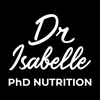ISABELLE'S OPINION:INTERMITTENT FASTING

ISABELLE'S OPINION: INTERMITTENT FASTING
The ketogenic diet and intermittent fasting have been, without a doubt, the most popular diets for two years. If I really do not recommend the ketogenic diet because of the significant restrictions that the approach imposes, the lack of variety, the unfavorable impact on the microbiota and LDL-Cholesterol, intermittent fasting seems more advantageous to me.
The literature surrounding intermittent fasting looks promising. However, for the moment, the majority of the results obtained are mainly based on studies in rodents or on very specific populations, such as among Muslims during Ramadan. These contexts therefore do not allow the results to be extrapolated to the general population. In the context of long-term weight loss (12 months and more), we do not see a greater effect than that which could be obtained with more standard calorie restriction. However, for some people, it is easier to reduce the amount of calories ingested if they are concentrated in a more limited time window, as is the case with the popular 16-8, for example. A person on a 16-8 type fast will eat for 8 hours and fast for 16 hours. In this case, many choose to eat from 12 p.m. to 8 p.m., for example. In people who are not hungry in the morning or in those who tend to snack in the evening, the results could be interesting. The daily caloric balance is negative, which causes weight loss.
Note that fasting is not recommended for people with eating disorders, pregnant women or diabetics who are taking medication that can induce hypoglycemia.
If you want to incorporate this approach into your lifestyle, make sure it doesn't harm your relationship with food. If you experience a feeling of deprivation while fasting and this causes you to eat beyond your satiety signals afterwards, this strategy is not for you. I also recommend that those who wish to integrate this approach do so with the support of a nutritionist. It remains important to optimize intake during the food intake period to ensure that nutritional needs are met. Those who limit food intake to one meal cannot meet their nutritional needs.
Finally, although the 16-8 is more popular, it is also possible to fast for a period of 24 hours and more, and to combine these fasting days with normal eating days. I don't agree with this version. Indeed, the latter seems much more difficult to me and risks affecting the social life of the person who is fasting.e.
@HansRolland Bonjour, je vous recommanderais de suivre une nutritionniste dans les démarches du jeûne intermittent afin de vous assurer de combler tous vos besoins. https://www.isabellehuot.com/pages/nutritionniste-dietetiste-rendez-vous
De plus, il est possible d’aller écouter la vidéo du Facebook en direct dans lequel je discute du jeûne intermittent avec Kathryn Adel, nutritionniste : https://www.isabellehuot.com/blogs/video/le-jeune-intermittent-sous-la-loupeBonjour!
J’aurais bien deux grandes questions concernant le jeûne, surtout s’il est prolongé de plus de 24 heures. Est-il utile de prendre des suppléments de type vitamines et minéraux (multi-vitamines multi-minéraux) pour compenser le manque de ces éléments ou bien est-ce que le corps gère ce manque sans avoir besoin d’aucune aide?
Aussi, qu’en est-il des performances d’entrainement en période de jeûne de plus de 24 heures? Il me semble que le fait de ne pas consommer de protéines prévient la réparation du muscle, à moins qu’il n’existe un mécanisme de production d’acides aminés par le corps qui m’est inconnu?@Reina: Bonjour Reina! Le jeûne intermittent n’est pas l’approche que nous préconisons pour stabiliser la glycémie sanguin et prévenir le diabète. Avec un bon suivi de la part d’une nutritionniste, vous obtiendrez des résultats tout à fait concluants. Appelez-nous et on vous aidera 1 877 761-5456!
Bonjour,
Je ne suis pas diabétique mais je suis sur le bord, est-ce que le jeune intermittent serait bon pour moi.
@ Cécile : Avec les recherches que nous avons actuellement, c’est effectivement une restriction calorique qui serait à l’origine de la perte de poids. Il demeure important d’optimiser, au niveau nutriments, ses prises alimentaires pour demeurer en bonne santé!











35 comments